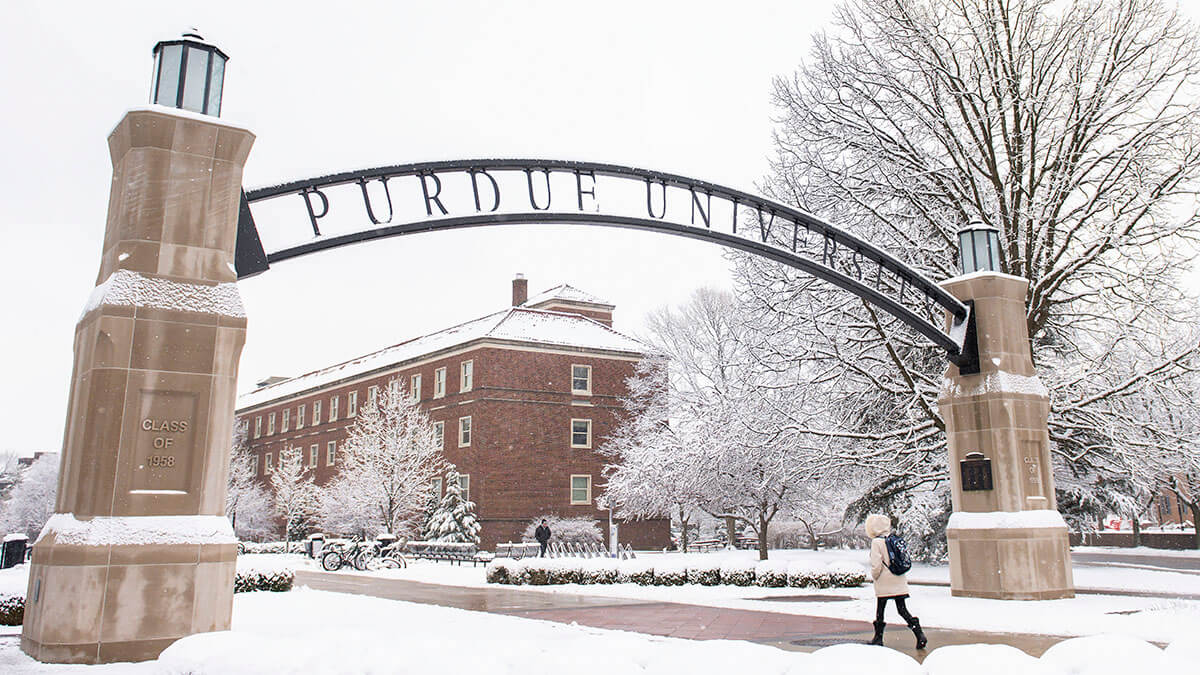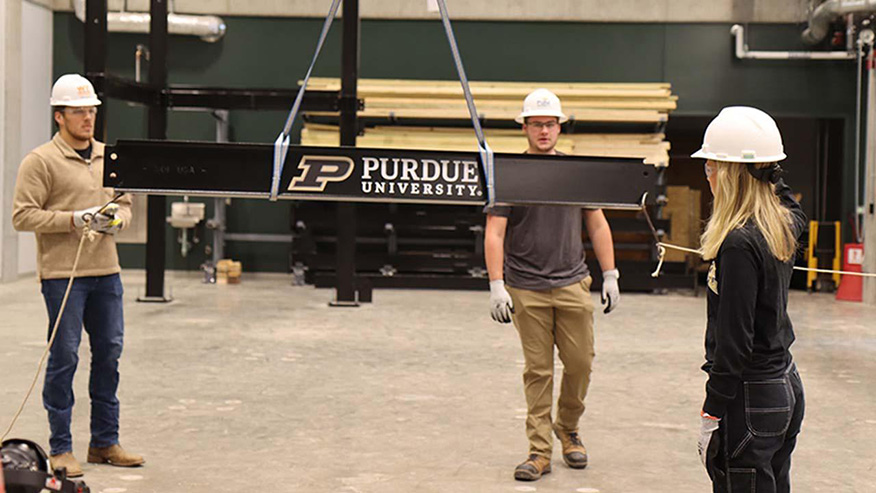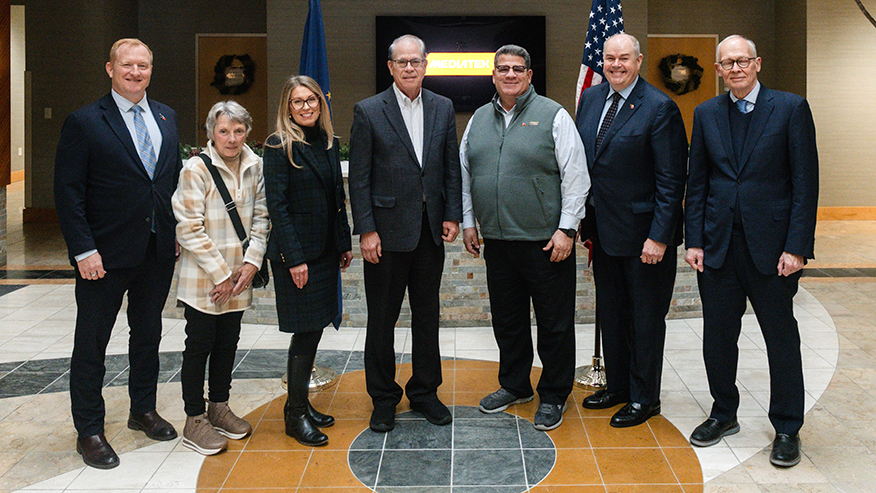Purdue trustees ratify faculty positions, award posthumous degrees, approve name changes

WEST LAFAYETTE, Ind. —
The Purdue University Board of Trustees on Friday (Dec. 2) ratified six faculty positions, awarded two posthumous degrees, and approved name changes to an academic department and a department head position.
The newly ratified positions are:
* Vijay Gupta, who was named the Elmore Professor of Electrical and Computer Engineering.
* Gerhard Klimeck, who was named the Elmore Professor of Electrical and Computer Engineering.
* Steven Steinhubl, who was named the Vincent P. Reilly Professor of Biomedical Engineering.
* Jennifer Richardson, who was named the College of Education 150th Anniversary
Professor.
* Andrew Mesecar, who was named a Distinguished Professor of Biochemistry.
* Santokh Badesha, who was named a Distinguished Professor of Electrical and Computer Engineering.

Gupta joined Purdue in 2022 as a professor in the Elmore Family School of Electrical and Computer Engineering. He has made fundamental contributions in the control of networked and cyber-physical systems. Cyber-physical systems integrate sensing, computation, control, networking and actuation into physical objects and infrastructure, connecting them to the internet and to each other. With applications spanning smart infrastructure systems, smart medicine, industrial control systems and robotics, among others, such systems hold the potential of fundamentally reshaping the world. Gupta has received several prestigious awards, including the 2018 Antonio J. Ruberti Award (given annually by the IEEE Control Systems Society to recognize outstanding achievements by a researcher under the age of 40 in control theory) and the 2013 Donald P. Eckman Award (given annually by the American Automatic Control Council to recognize outstanding achievements by a researcher under the age of 35 in control theory). He is a fellow of the Institute of Electrical and Electronics Engineers (IEEE). Gupta also has been a co-author on several papers that won best student paper awards.

Klimeck, who earned a PhD from Purdue in 1994, worked at Texas Instruments and NASA/Jet Propulsion Laboratory before returning to the Elmore Family School of Electrical and Computer Engineering in 2003 as a professor. As technical director and later director of the Network for Computational Nanotechnology, he established nanoHUB.org as a global cyberinfrastructure and helped to grow the annual user numbers from 500 to 2 million. His simulation apps have been adopted by over 100 universities, and annually over 8,000 students interactively explore semiconductor devices in formal classroom settings through the platform. His research focuses on multiscale and multiphysics modeling of nanodevices, with applications to today’s nanotransistors and quantum computing devices. Klimeck has received several prestigious awards, including being named a fellow of the Institute of Electrical and Electronics Engineers, Institute of Physics, American Physical Society and American Association for the Advancement of Science. He been awarded six patents and has authored one book, 10 book chapters and more than 500 peer-reviewed journal articles and proceedings.

Steinhubl came to Purdue in Fall 2022 as a professor of biomedical engineering and member of the Regenstrief Center for Healthcare Engineering in the Weldon School of Biomedical Engineering. He is regarded as a founding pioneer and top leader in digital medicine and cardiovascular digital health. His research contributions to cardiovascular medicine are well known, and he has received numerous honors, including being elected a fellow of the American College of Cardiology and a fellow of the American Heart Association. Additionally, he was the founding editor-in-chief of the Nature partner journal Digital Medicine. Steinhubl is a career-long clinician scientist and founding director of digital medicine at Scripps Research’s Translational Institute. In 2021 he transitioned part time to physIQ, a health care data analytics startup, as its chief medical officer.

Richardson, a faculty member at Purdue since 2002, teaches in the Learning Design and Technology program in the College of Education’s Department of Curriculum and Instruction. She has an exceptional record of high-impact teaching and learning scholarship and activities and was instrumental in the development of Purdue’s first fully online master’s degree program in learning design and technology. This program was recently ranked No. 8 nationally by U.S. News & World Report. Richardson also led the design and development of the Purdue Repository for online Teaching and Learning – or PoRTAL – an open education resource repository of innovative teaching and design strategies. Richardson is a member of Purdue’s Teaching Academy and has won numerous other university teaching honors, including the Teaching Leadership Fellow Award and the inaugural Digital Education Scholarship of Teaching and Learning Award. Her outstanding reputation for collaboration with graduate students is well deserved; she has co-presented with over 75 different graduate students at national and international conferences and published research with over 65 different graduate students.

Mesecar is the Walther Professor in Cancer Structural Biology. He is a leader in basic research on the structure and function of enzymes involved in disease, as well as in targeting these enzymes with drugs using structure-based design approaches. His work on X-ray structures of coronavirus proteases was instrumental to drug development during the current pandemic and the previous SARS epidemic. Mesecar has an exceptional scholarly record, with over 150 publications and 100 invited talks. He has had a record of continual funding from the National Institutes of Health and has lent his expertise to many panels, institutions and cancer research centers around the world. In addition, Mesecar has served for seven years as head of the Department of Biochemistry and, since August, as interim director of the Purdue Center for Cancer Research after serving as deputy director since 2010. His students have been successful as scientists, physicians, CEOs and lawyers across the country.

Badesha has been the adjunct innovation professor in the Elmore Family School of Electrical and Computer Engineering and the College of Engineering since 2020. During a long career with Xerox Corp., he was recognized as one of the most prolific inventors in the firm’s history, and his inventions can be found in virtually every Xerox product today. He made groundbreaking contributions in digital printing technology while building significant links among industry, government and academia. Badesha has received numerous prestigious awards, including being a member of the National Academy of Engineering, a fellow of the National Academy of Inventors and an honorary member of the Society for Imaging Science and Technology. He is a co-inventor on 262 issued U.S. patents, with another 55 U.S. patents pending. He is the author or co-author of more than 40 journal papers and has written 10 book chapters and white papers.
In other action, trustees awarded a posthumous Bachelor of Science in computer science degree to Vijay Viswan and a posthumous Bachelor of Science in electrical engineering degree to William Charles Thornhill, both from Purdue West Lafayette. Deceased students who have earned at least 85% of their credit-hour requirements and satisfied most of the requirements for a major may be nominated for a posthumous degree.
Trustees approved changing the name of the Department of Human Development and Family Studies to the Department of Human Development and Family Science and approved renaming the J. William Uhrig and Anastasia Vournas Head of Aeronautics and Astronautics to the Uhrig & Vournas Head of Aeronautics and Astronautics.
The shift from “family studies” to “family science” will better represent the scientific rigor and modern developments in the field; more accurately represent scholars, students and professionals as family scientists; and more accurately represent both discovery of knowledge and application of knowledge. In addition, the new name will align with two existing undergraduate majors – developmental and family science; family and consumer sciences education – as well as the name of the college (Health and Human Sciences) and four other HHS units.
About Purdue University
Purdue University is a top public research institution developing practical solutions to today’s toughest challenges. Ranked in each of the last five years as one of the 10 Most Innovative universities in the United States by U.S. News & World Report, Purdue delivers world-changing research and out-of-this-world discovery. Committed to hands-on and online, real-world learning, Purdue offers a transformative education to all. Committed to affordability and accessibility, Purdue has frozen tuition and most fees at 2012-13 levels, enabling more students than ever to graduate debt-free. See how Purdue never stops in the persistent pursuit of the next giant leap at https://stories.purdue.edu.
Sources: Jay Akridge
Gerhard Klimeck
Vijay Gupta
Steven Steinhubl
Jennifer Richardson
Andrew Mesecar
Santokh Badesha



